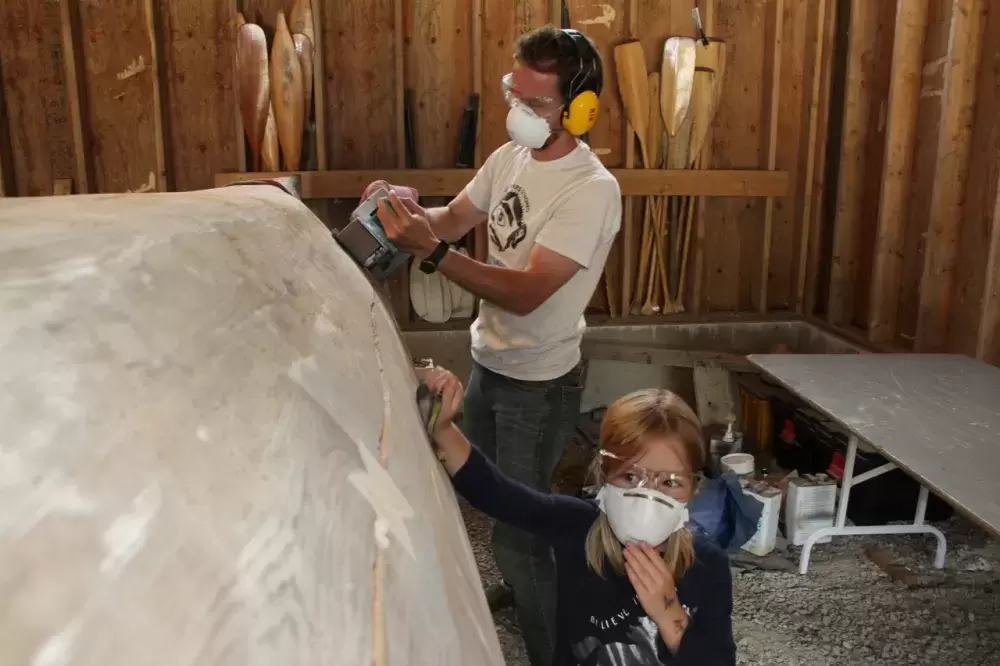Thanks to funding provided by the B.C. government, members of the Tseshaht First Nation will once again be able to participate in a lengthy paddle to the state of Washington.
Members of the Nuu-chah-nulth First Nation found out in March that they were being awarded a $10,000 grant via the province’s Community Resilience Through Arts and Culture Program.
These funds will help to refurbish a canoe which had been sitting in the bush on the First Nation for a number of years.
The plan is to utilize this refurbished canoe on the Paddle to Lummi, an event which sees members of Indigenous communities travel through various waters, eventually converging on the Lummi Indian Reservation in the state of Washington.
Last year Tseshaht members as well as groups from other Nuu-chah-nulth nations had taken part in the Paddle To Puyallup, which is a Washington city about 15 kilometres southeast of Tacoma.
People are expected to arrive in Lummi for a five-day celebration, from July 24-28. Paddlers in more than 100 canoes will travel to the event.
The Tseshaht group will begin its journey on July 4 from Port Alberni. Besides those paddling, the Tseshaht representatives will include support crew travelling alongside in a motor boat as well as a land crew, which will drive and help prepare camping accommodations along the journey.
As a result, the Tseshaht’s entire contingent will consist of about 25 people.
Corey Anderson is once again the lead organizer of the Tseshaht group. The local canoe can accommodate 10 paddlers and a skipper. As of Monday, June 3, six of the First Nation’s members had confirmed their participation. But Anderson is not worried about getting a few more bodies, even from other First Nations if need be.
“I guess it happens to every canoe family,” Anderson said of the quest to find enough paddlers to make the lengthy journey. “People usually hop in though at the last moment. Last year we had one girl who decided the night before that she was going to go with us.”
Anderson added he’s not getting stressed out about finding enough people to join the Tseshaht team.
“The lesson we learned last year is that it does all come together,” he said. “There’s always people that want to go.”
For those who might be interested in taking part, a message can be sent to Anderson via the Tseshaht Canoe Family’s Facebook page at https://www.facebook.com/tseshahtcanoefamily/
In 2018, the Tseshaht group used a family-owned canoe for its journey to Puyallup. That boat was unavailable this year. Thus, Anderson was thrilled when he heard the First Nation would be receiving provincial funding, which is helping to fix up another boat.
“We gratefully acknowledge the financial support of the province of British Columbia,” he said.
So far Tseshaht members have worked on sanding the bottom of the canoe. Some cracks are also being repaired before workers can start applying fibreglass.
Anderson is unsure how long this process will take.
“Hopefully it doesn’t take more than 31 days,” he joked, referring to the date the canoe is expected to begin its journey from Port Alberni.
Upon arriving in Lummi, the hosts will assist all the attendees in celebrating, honouring and preserving the unique cultural heritage of the Coast Salish people.
Coast Salish tribes of yesteryear had travelled the same Northwest waters to gather for trade, ceremonies and celebration.
Anderson said the Paddle to Lummi will also serve as a spiritual journey.
“People with all sorts of issues in their lives can forget what is going on and be free from all their hardships,” he said. “Along the way the journey is supposed to heal them.”
Meanwhile, officials from the Tseshaht First Nation are also busily making plans for their Going Home initiative. The First Nation recently bought a canoe which can seat 21 adults for $32,000, including paddles, a trailer and lifejackets.
The plan is to take members from the First Nation on the 36-foot canoe to various parts of the Broken Group Islands, to see how some of their ancestors lived, hence the name Going Home.
Many of the villages that make up the Broken Group Islands are now historic sites. A couple of the islands have cabins on them belonging to the Tseshaht First Nation.
Darrell Ross, Tseshaht’s research and planning associate, said the First Nation is currently training a number of individuals to act as guides for its members who wish to travel to the Broken Group Islands.
“Canoe journeys have really escalated in western British Columbia,” Ross said. “There’s lots of participation and understanding of canoe journeys and canoe culture.”
For the immediate future, the First Nation will be utilizing its recently-purchased canoe to transports only its members to the islands. Ross said perhaps in future years Tseshaht might open up a business and offer canoe trips to the public.
“Ecotourism has really taken off,” he said. “I doubt we would have (public) tours this year. But maybe it will happen in the future.”







